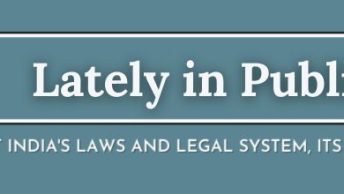A fortnightly feature inspired by I-CONnect’s weekly “What’s New in Public Law” feature that addresses the lacuna of a one-stop-shop public law newsletter in the Indian legal space.
What’s new at LAOT
The Law and Other Things Team will be hosting the Courts and the Constitution Conference, 2024 on March 30-31 in collaboration with its institutional partners, NALSAR University of Law and Azim Premji University. The conference is an attempt to bring together diverse voices from the bench, bar, academia, and journalism to deliberate on the landmark legal developments that are bound to have a long-term impact on governance and the rights of the citizenry. Stay tuned for updates!
Anshul Damia, Autonomy in the Age of Interference: UGC Regulations and the Tryst of its Complicated Relationship (highlights the dichotomous relationship between UGC Regulations and National Law Universities and how the National Law Universities carve out exceptions for themselves from UGC regulations).
Lately in Academic Articles
1. Jindal Global Law Review recently a Special Section on culture and litigation:
a. Livia Holden, Malvika Seth, Ashwin Mishra & Max Steuer, The rise of cultural expertise in litigation (introduces “cultural expertise” as an area of study and its different facets, and presents an overview of the Special Section).
b. Aishwarya Singh & Meenakshi Ramkumar, Courts, culture, and complicity: How anthropological knowledge sustains state imaginations of indigeneity (explores and analyzes the themes published in the Special Section on Cultural Expertise in the American Anthropologist).
2. Om Agarwal, Beyond Administrative Law Review: Assessing Ordinance Promulgation through the Lens of the Basic Structure Doctrine, NUJS Law Review (proposes a model of testing ordinances through the basic structure doctrine and further extends the rule of separation of powers to rationalize the application of this doctrine).
3. Surabhi Singh, The Supreme Court in X v NCT of Delhi: feminist expectations, feminist foregrounding but feminist outcomes?, Indian Law Review (Discusses the Supreme Court’s judgment in X v. NCT of Delhi, and argues that it does not adequately improve access to abortion in India).
4. Akshat Agarwal, LGBT+ rights claims for marriage equality and the possibilities of transforming Indian family law, International Journal of Constitutional Law (argues that legally recognizing marriage equality in India will positively impact existing families by expanding recognition of diverse families, and can have implications for guardianship laws, adoption laws, protections for single parents,etc.).
Elsewhere Online
1. Anshul Dalmia, Who Judges the Judges? Intellectual Bias as a Ground for Judicial Recusal, Indian Constitutional Law and Philosophy Blog.
2. Surbhi Karwa, 5 Years After Ranjan Gogoi, No Clear Rules About Sexual Harassment Related To Chief Justice Of India, Article14.
3. Itamar Mann, The Missing Party: On South Africa’s Legal Strategy in its Genocide Application before the ICJ, The Verfassungs blog.
4. Moiz Tundawala, Book Review | Why Not to Call the Constitution Colonial, The NLS Blog.
5. Vineet Bhalla, 1951 to 2019: How the Indian judiciary turned the Babri Masjid into the Ram Mandir, Scroll.
6. Neetika Vishwanath, Justice for Bilkis Bano, questions on remission, The Hindu.
Listen Up
1. Raman Chima and Aroon Deep, Does the Telecommunications Act, 2023 bolster the government’s digital regulation powers?, In Focus by The Hindu (analyzes the concerns around the surveillance and regulation mechanisms in the new Telecommunications Act).
2. Suhas Palshikar and Arun George, The issues with the ‘one nation one election’ plan, The Times of India Podcast (examines the ‘one nation, one election’ plan and explains the concerns surrounding the same).
3. Shailesh Gandhi and Arun George, What selfie points reveal about Right to Information, The Times of India Podcast (discusses the infringement of the Right to Information in light of the transfer of an official for revealing information about government selfie points).
Opportunities and Other Things
1. 8th Pranita Mehta Memorial Essay Writing Competition by NLUJ.The last date to submit is January 29, 2024.
2. Call for papers by the RGNUL student Research Review. The last date to submit the abstract is January 31, 2024.
3. Call for registration for the 5th GNLU Annual Legal Services Forum, 2024 (GALSF). The last date for registration is January 31, 2024.
4. Vichaar- Policy Drafting Competition 2024 at CLPPG-NLU Assam. The last date to register is February 14, 2024.
5. Call for papers by the 2nd International Conference on the Right to Equality by Nirma University. The last date to submit the abstract is February 15, 2024.
6. Call for papers by the DBRANLU Law Review. The last date for submission is February 29, 2024.
This initiative was started by Eeshan Sonak, Aditi Bhojnagarwala, Jeetendra Vishwakarma, and Saranya Ravindran from the Law and Other Things Student Team with the guidance of Surbhi Karwa and Gaurav Mukherjee.





[…] Posted byLAOT Team […]